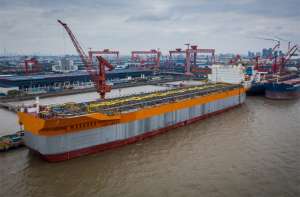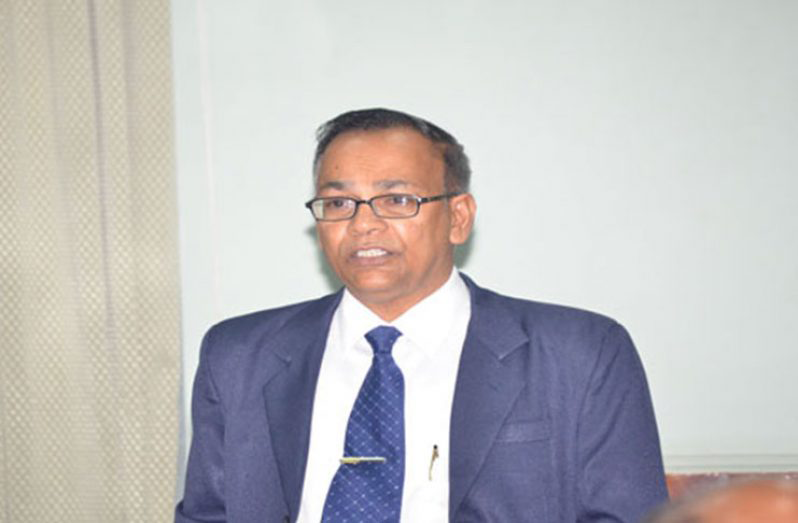— as local Audit Office continues to build capacity to analyse petroleum sector
CONTRACTS related to Guyana’s oil-and-gas-sector will soon be audited by the Audit Office of Guyana, as this agency is constantly building capacity to analyse almost every aspect of the burgeoning sector. The importance of transparency and accountability is practically implied in this case because it is common knowledge that the oil-and-gas-sector, in any economy, is usually “big business”. Audits help governments and companies maintain a transparent working arrangement, and ensure costs are tightly controlled.
Here in Guyana, the Audit Office is charged with scrutinising the expenditure of public funds on behalf of the Parliament of Guyana. The office conducts financial audits of all publicly funded entities, including donor-funded entities, local Government agencies and trade unions, in Guyana.

By virtue of its mandate, the Audit Office is placed at the fore of any push for accountability and transparency, especially in cases related to new and emerging sectors.
The Working Group on audit of Extractive Industries (WGEI) — a product of the International Organisation of Supreme Audit Institutions — has said that building strong institutions is vital to Natural Resource Management. “Citizens are excited about the benefits that come along with oil discoveries and at the same time elites are worried about the so called resource curse as it has been witnessed in some resource rich countries,” the working group posited, adding that many studies put emphasis on good governance that entails transparency and accountability as the solution to the oil curse. The working group has advised that cost recovery and compliance audits would be very vital under Production Sharing Agreements (PSA) regime and service contracts, whereas, value for money and financial audits may be critical under the concessionary arrangements.
COMMITTED TO REVIEW
Locally, the Government has already committed to reviewing all the provisions in the PSA with ExxonMobil and identifying areas where Guyana can “get more” for its natural patrimony. Under the PSA governing the Stabroek Block, Guyana will be receiving, at minimum, two per cent royalty on all oil produced in the Block, plus 12.5 per cent profit oil.
As the capital and operating costs are liquidated, Guyana’s share of profit oil will increase, rising up to 52 per cent return on every barrel of oil sold.
ExxonMobil Guyana has made 18 discoveries at the Stabroek Block, offshore Guyana, since May 2015 and began production in December 2019 from the Liza Phase one development project.
And the Liza well represents only the tip of the iceberg, in terms of investments, as the company has committed to investing more than US$9 billion in its new Payara development, the largest single foreign investment in Guyana’s history.
Ahead of the anticipated advancements in this nascent sector, the audit office is positioning itself to ensure that accountability is maintained.
For some time now, the Audit Office, according to Auditor General, Deodat Sharma, has been working with the British Columbia Audit Office and the Canadian Audit and Accountability Foundation to build capacity to audit various aspects of the oil-and-gas-sector.
Under the guidance of the partnering agencies, the local audit office has been able to conduct a performance audit of Guyana’s preparedness for Marine Oil Spill Response.
“We already started this… we have done 70 per cent of the audit on if we are prepared in the case of an oil spill… is only COVID [COVID-19] make it hold up, but we are hoping to issue the report on this one shortly,” Sharma said during a recent interview with the Guyana Chronicle.
The office, after this is completed, will be moving to other areas like gas flaring and the auditing of oil contracts.
Specific to the contracts, Sharma said, the office should have the capacity to audit those a few years from now.
“We are getting our training… it is a new area and just like everybody else we are trying to get a grasp of it,” the Auditor General said.
Most of the training is being conducted online due to the pervasive COVID-19 pandemic, but Sharma remains confident that the result of the exercises would still be effective.
The Guyana Revenue Authority (GRA) has already audited the over US$460M in pre-contract cost provided by ExxonMobil while searching for oil in Guyana.
Esso Exploration and Production Guyana Limited (EEPGL), a subsidiary of ExxonMobil, has stated that pre-contract cost incurred under the 1999 Petroleum Agreement prior to the year ended 2015 amounted to US$460,237,918.
They broke this down stating that the drilling of the Liza 1 well cost US$230M; seismic surveys on 20,000 km of ocean floor cost US$140M; US$25M on overhead costs and the payment of critical persons such as geo-scientists, engineers and geologists amounted to over US$65M.




.png)









